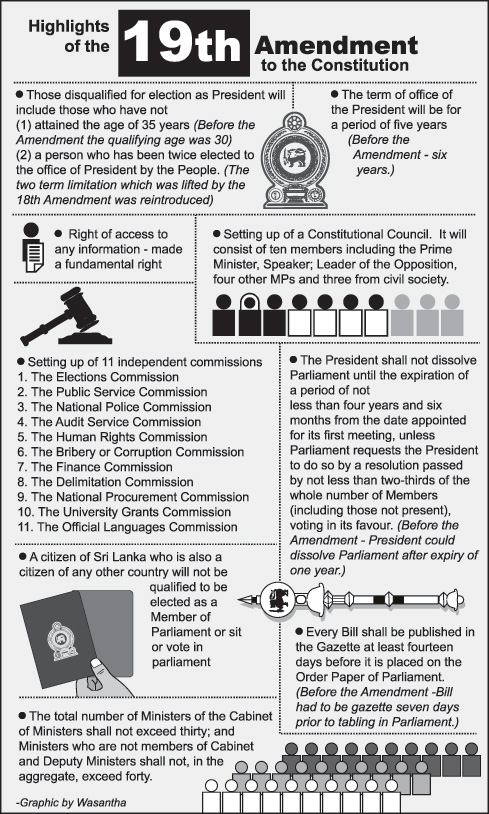Columns
President’s finest hour as he honours pledge restoring people’s dignity
When President Maithripala Sirisena stood up to speak in Parliament on Monday morning, he was on the threshold of fulfilling the most important pledge he made to the people during his election campaign. He was also fulfilling a promise two of his predecessors had pledged to keep but reneged, once elected to the almost unassailable office of the executive president of the country.
 It may have been a twist of fate, but nearly 40 years after the enactment of the 1978 Constitution, it fell on the shoulders of a man thrust into the presidency quite unexpectedly, to take the historic step of downsizing the powers of the President by way of the 19th Amendment to the Constitution.The President who kicked off the two-day debate on the much anticipated Bill, said there is general consensus in the country that the excessive powers vested in the President must be reduced, and replaced with a system where the President was answerable to Parliament. “We need a system under which there is respect for the views of others, and we need to build a more democratic and disciplined society,” he said.
It may have been a twist of fate, but nearly 40 years after the enactment of the 1978 Constitution, it fell on the shoulders of a man thrust into the presidency quite unexpectedly, to take the historic step of downsizing the powers of the President by way of the 19th Amendment to the Constitution.The President who kicked off the two-day debate on the much anticipated Bill, said there is general consensus in the country that the excessive powers vested in the President must be reduced, and replaced with a system where the President was answerable to Parliament. “We need a system under which there is respect for the views of others, and we need to build a more democratic and disciplined society,” he said.
With no clear indication of the two-third majority required to get approval for the Bill, the President, in his speech, cleverly put the onus of ensuring the Amendment gets the required numbers on the MPs, urged them to seize the opportunity to partake in a pious deed. “Today, you have the historic opportunity to win the respect of all the people of this country, by approving the 19th Amendment. I believe all 225 MPs here today have the opportunity to be part of a historic deed,” he said.
While almost all MPs agreed that the executive presidency has been, for too long, the bane of the country, one group of UPFA legislators, mainly those aligned with former President Mahinda Rajapaksa, were adamant that certain amendments be introduced to the 19th Amendment draft before the House, if they were to support it.
Even by late evening on the second day of the debate on Tuesday, there were disagreements between the ruling side and the UPFA, which at one point looked as if they would scuttle the passage of the Bill. President Sirisena stayed on at his office in the Parliament complex throughout Tuesday, talking to both members of the Government as well as the UPFA, and separately also to members of the Sri Lanka Freedom Party (SLFP), in order to iron out differences.
In the end, the UNP-led minority Government had to compromise to allow for the composition of the Constitutional Council to include more politicians than members of civil society, as well as prune down the powers of the Prime Minister with regard to the appointment of members to the Cabinet, but it was the only way that the Amendment could have got the required number of votes to have it pass. Prime Minister Ranil Wickremesinghe, one of five present legislators who was in Parliament when the 1978 Constitution was enacted, said that, 37 years later, the country has a President willing to transfer power to Parliament.
“The 19th Amendment, despite the last minute changes to it, is a significant step towards creating a more democratic society,” he said.
In the end, 215 MPs voted in favour of the Amendment during the Second reading of the Bill, while UPFA MP Sarath Weerasekera voted against the Bill, and Galle District Independent MP Ajith Kumara abstained. Seven MPs were absent when the vote was taken. Four hours later, close to 11pm on Tuesday, MPs voted again, this time on the final reading of the Bill, once again overwhelmingly in support of it.
Ampara District MP Weerasekera, a retired Navy officer, the sole member to oppose the Amendment, said he fears that the changes to the Constitution will jeopardise the sovereignty and territorial integrity of the country. “This amendment will give an unfair advantage to minorities, and has been drafted by those with links to NGOs that work against the interest of the country,” he said in a statement issued after his “No” vote.
Despite last minute misgivings, President Sirisena’s intervention helped quell any moves to sabotage the passage of the Bill, and in the end, both Government as well as UPFA MPs were able to claim credit for voting in support of a Constitutional amendment that has overwhelmingly wide public support.
The passing of the Bill will no doubt be a boost to President Sirisena, and will help him consolidate his position within the SLFP and also the UPFA. But for the UNP-led minority government, many new challenges await, including circumventing a possible “No Confidence” motion against Finance Minister Ravi Karunanayka and another motion to be placed before the House seeking the removal of Central Bank Governor Arjun Mahendran.
The 20th Amendment to the Constitution which will introduce Electoral Reforms too will be placed before the House when it next meets on May 19. Whether the President can continue to appease those in the UPFA and justify their support for a minority government will be the next big challenge for him till he decides to dissolve Parliament.



Leave a Reply
Post Comment